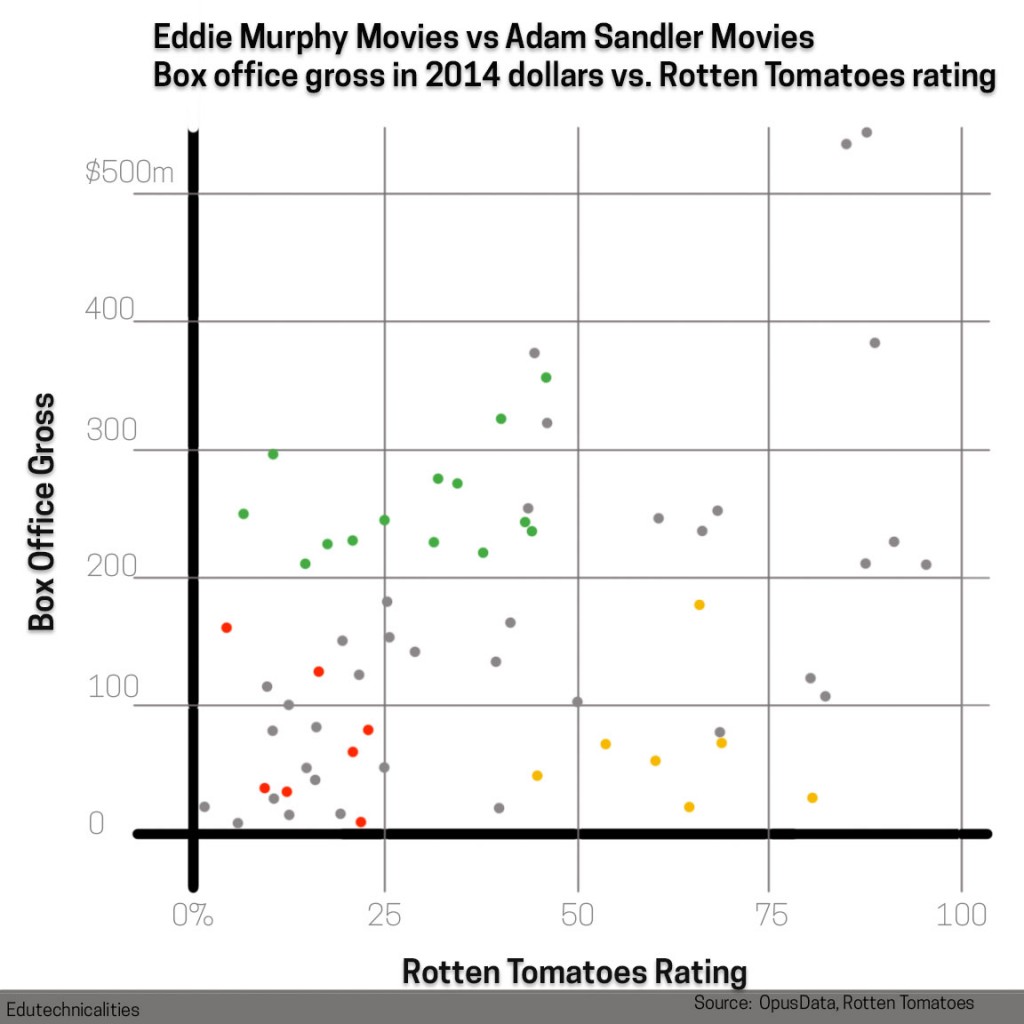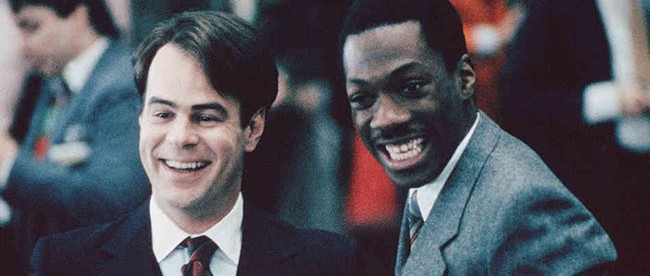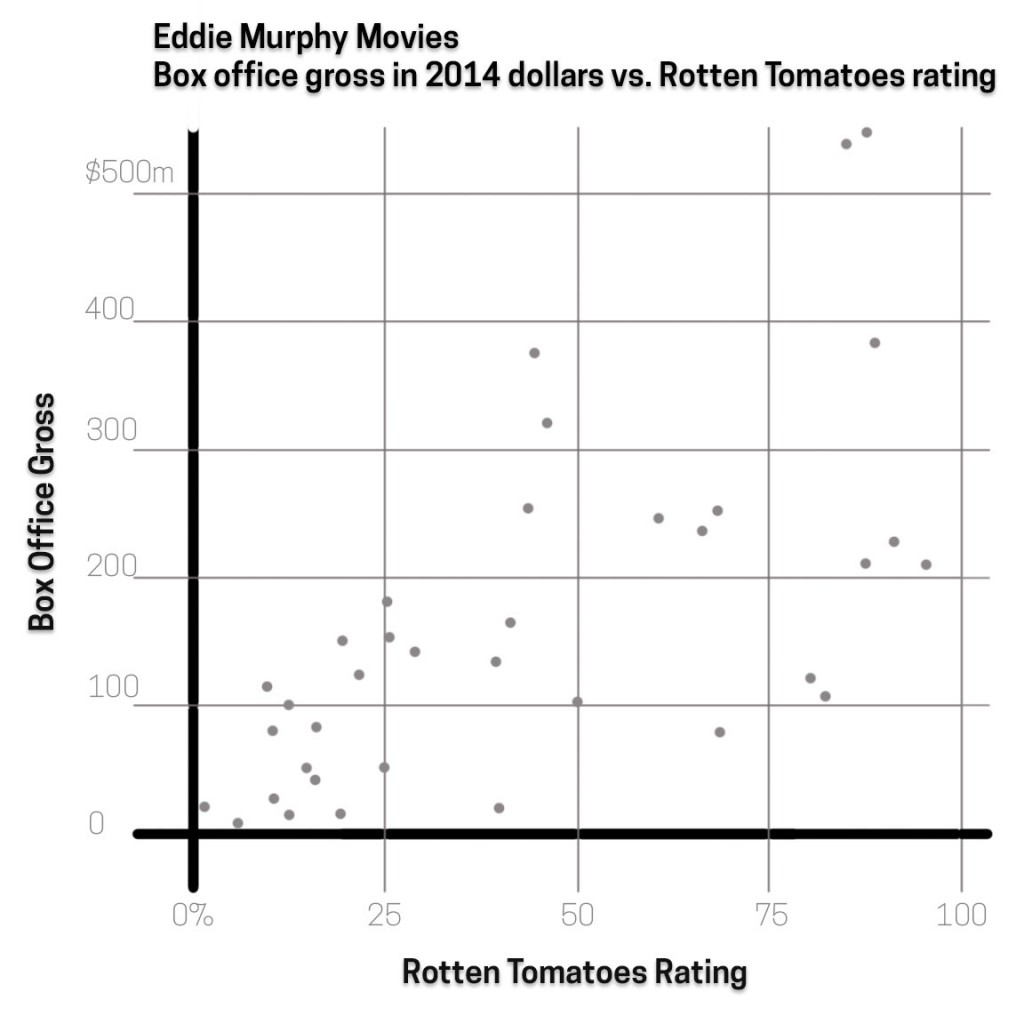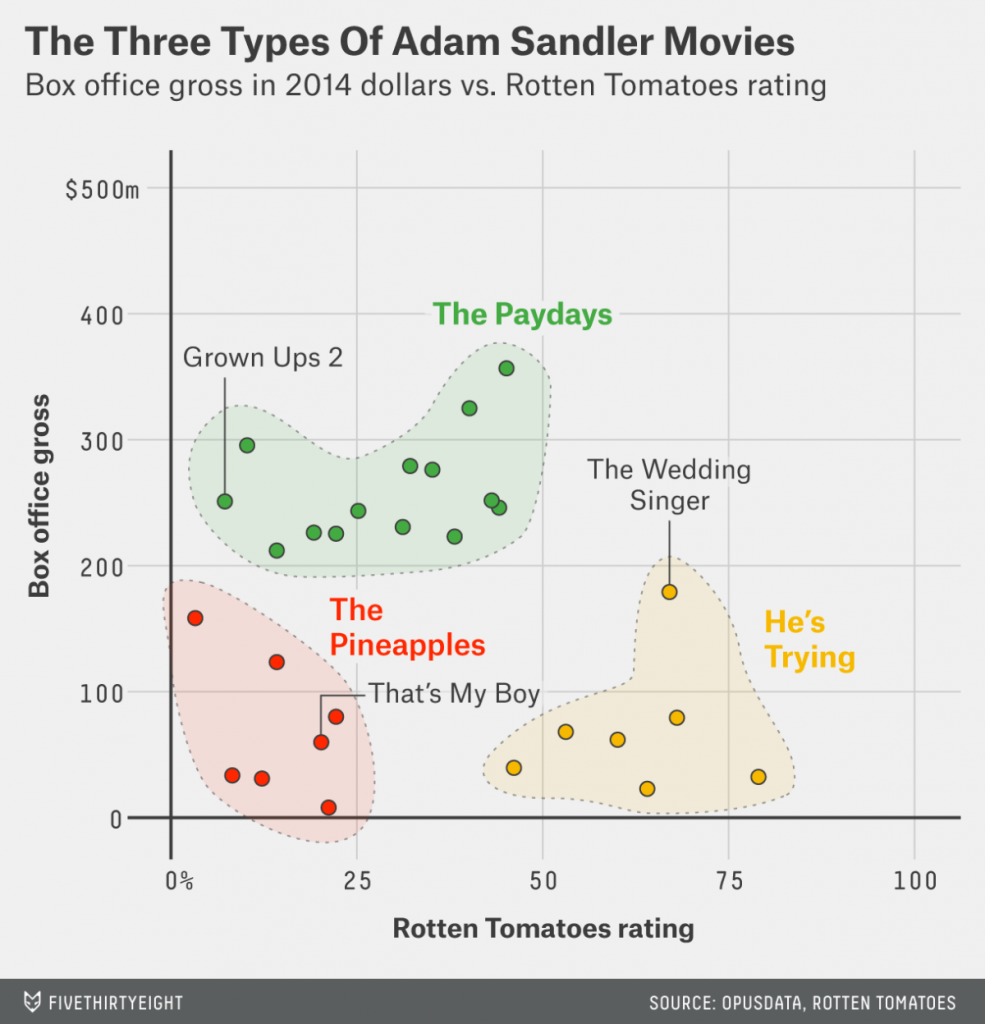The Eddie Murphy MOOC Mystery – Part 1
There is nothing that could stop me from reading a blog post entitled MOOCs as Eddie Murphy. Yes, Martin Weller wrote it so it was bound to be good, but if the author had been Martin Short, Peter Weller, or even Peter Short, the film and MOOC combo is my academic can’t-miss. What I did not expect was for the read to turn into a multi-part response on my part, complete with statistical analysis. There are tangents, there are rabbit holes, and then there is this. With that in mind, here is the first part of a two-, three-, or potentially four-part response to a 200 word blog.
Part 1 – Is Eddie Murphy’s film career an apt metaphor for MOOC hype? Establishing a baseline.
Introduction
On May 12, Martin Weller mused on the topic of MOOC hype in regards to the acronym being thrown into research proposals and innovation lab discussions. He used the lens of Eddie Murphy’s movie career to ground the discussion. It is important to note two things here: the first sentence of the blog was, “File under: pointless things that occur to you while walking the dog,” and there is a disclaimer in the subhead of Weller’s blog The Ed Techie that negotiates the domain as a space for over-stretched metaphors
I saw Weller making three arguments in the blog (paraphrased here):
- Most Eddie Murphy films are not very good; in the eyes of producers, though, Eddie Murphy + Any Script = Success.
- The Murphy + Any Script = Success formula, whether it works or not, has more and more application in education research & innovation bids when MOOC replaces Murphy (MOOC & Any Innovation/Research Proposal = Success)
- The weight of bad Eddie Murphy movies in the end brought him down, and the same thing will happen with MOOC association in research & innovation.
Whether Eddie Murphy movies are good or not is a somewhat subjective argument; we can measure along strata of critic review aggregation (such as Rotten Tomatoes), viewer satisfaction aggregation (such as IMDB), or box office receipts (some measure via awards, but Murphy is primarily a comedic actor and comedies are found wonting in awards discussions). This also means that success is a somewhat subjective argument; we can measure success by the same strata: critics, viewers, and box office.
Success has another dimension in film, however, the classic or the archetype, a film that remains a part of the dominant culture’s lexicon and canon or help establish and push forward a subculture [example – blaxploitation films of the 1970s were not critical, cultural or financial successes but the movement was integral in the foundation for movies such as Spike Lee’s Do the Right Thing]. The seemingly intangible or immaterial elements of a film that help transcend standard metrics have been debated and poured over in cultural as well as scholarly works. Using Do the Right Thing as an example, it was not a box office success and it does not receive consistent playing on pay TV channels, but it has remained an integral part of courses in film production, film studies, cultural studies, urban studies, and other fields of research and popular culture. There is not a standard metric on which to define a classic film; however, this does not preclude us from analyzing films beyond analytics.
Most Eddie Murphy films are not very good
Eddie Murphy’s relationship with movies of poor quality and attempts to pop a box office number has a long history. Success in the terms of the Murphy & Any Script formula is measured in box office dollars. Murphy’s career has considerable box-office power; as of May 2015 he is the fifth-highest box office draw of all-time (and his per-movie average is in the top quintile of the Top 50), and the greatest draw to come from Saturday Night Live. He has also made some terrible movies, movies that not only lost money and clout at the box office, but rank on a short list of greatest box-office failures of all time.
Are Eddie Murphy movies bad, though? I accessed Rotten Tomatoes and OpusData to get information on the gross box office receipts for every Eddie Murphy movie as well as the aggregate score from film critic reviews. Eddie Murphy has made 37 movies since 1982; and unlike other actors, he has had top billing or second billing in nearly all of them.
This chart is somewhat light on content; as pictured here $100 million is close to the bottom, so at first glance movies in the 100-200 million range look rather low. As of 2015, a $100M box office on a movie is considered decent for many movies and break-even for some. In his career, less than 20% of Murphy’s movies have had budgets over $100M inflation-adjusted dollars.
All that said, it is tough not to notice the hoard of movies in the bottom left grid, 11 of his 37 movies land firmly in that space. That is a tremendous percentage of bombs. But again, we lack a great deal of context in interpreting this information — there are also some rather high marks out there. We need a point of reference.
Most Adam Sandler movies are not very good.
I will use Adam Sandler as example for two reasons. First, Eddie Murphy as a comparable for both MOOC hype and as parallel to Adam Sandler’s career is an interesting road to travel down; while Adam Sandler is widely dissected and derided for his payday-minded acting career choices in the Age of the Internet, his comparable in the grey literature is usually Eddie Murphy. Second, there was an excellent chart at the Five Thirty Eight website plotting Sandler’s movies less than a month ago.
The author groups these into three categories — Pineapples are the bombs, Paydays are movies with low critical acclaim but high returns, and He’s Trying is the intangible space people who want to like Adam Sandler movies tend to focus (movies like Billy Madison, Happy Gilmore and The Wedding Singer are here). When we superimpose the Sandler Chart, identifying an actor dedicated to box office returns, onto the Eddie Murphy chart, we can better analyze Murphy’s worth.
Murphy has made nine more movies than Sandler (I also cannot tell if the Sandler animation Eight Crazy Nights is included in his statistics), yet Sandler has 14 films that have grossed over $200m compared to Murphy’s 12. Also, if we were to use the FiveThirtyEight metric for Pineapples, Sandler has 7 while Murphy has 13. From this data, we could draw a conclusion that Adam Sandler is a much more consistent deliverer of box-office hungry movies, and in those terms a greater success than Eddie Murphy.
But the question is not about Sandler versus Murphy box office; we want to know if we can compare the Eddie Murphy movie hype to the MOOC hype, and the assumption was that Eddie Murphy makes bad movies. And depending on how judge a movie’s quality, Adam Sandler makes much worse movies than Eddie Murphy; only six Sandler movies have critic scores above 50% compared to Murphy’s 12. Moreover, Murphy has 8 that are above 75%, rarefied air…and dwarfing Sandler’s one highly-rated movie.
Who is more MOOC?
If we equate success to dollars, Adam Sandler makes sense as the metaphor in relationship to adding MOOC to research or innovation proposals. It is an easy conversion, a safe and standard and convenient comparison. But MOOC hype is much, much more complicated than such things — Weller notes the MOOC phenomenon in in the midst of a backlash and imagines the result to be similar to what he calls the ‘wearing thin’ of Eddie Murphy movies. The MOOC conversation has only included monetary gains as one element of potential success. There are other analytics — enrollment, retention rate, existing measurement of learning, application to existing or new certificates/credentials/degree paths. There are also some intangibles or immaterials – student growth or transformation based on the course, connection and collaboration and creation from the course — and many in the field of education value these contemporary elements of learning theory as the most important aspects of learning in a digital space, MOOC or otherwise.
Eddie Murphy has some stratospheric successes and some rock-bottom failures in cinema, whether judging by viewer reaction or box office gross. He also can lay claim to transcending box-office cinema in a number of subcultures; Adam Sandler is known for the Sandler Movie a la Billy Madison and Happy Gilmore, but Eddie Murphy was part of movies that can lay claim to classic or archetype status: changing the detective partner dynamic in cinema (48 Hours), culturally defining the 1980s (Beverly Hills Cop), providing a standard for screenwriting courses to this day (Trading Places), and not to mention winning critically prestigious awards for his turns in Coming to America and Dreamgirls. His successes and his failures are epic. His name carries an ethos that, if this blog is any indication, is more complicated than first blush. Like the MOOC, there is a simple argument to make about the quality of Eddie Murphy movies, and like the MOOC, there is a lot more nuance when you get inside the debate and really try to define quality and prospects amidst hyperbole and false memory. Eddie Murphy might not be the perfect lens for the MOOC metaphor, but the acronym MOOC is not the perfect lens for the EdTech phenomenon. And that is part of what makes this a good match.
Next Time: Part 2 – Eddie Murphy takes on the Gartner Hype Cycle.




This is insanely great! And with data. Who are the Paul Newmans in MOOCs? William Shatners? You could blog like this for months…
Don’t get me started down this path, Alan!